
e così così ci siamo tolti qualche curosità su Terraforming Mars... e presto arriveranno altre interviste.
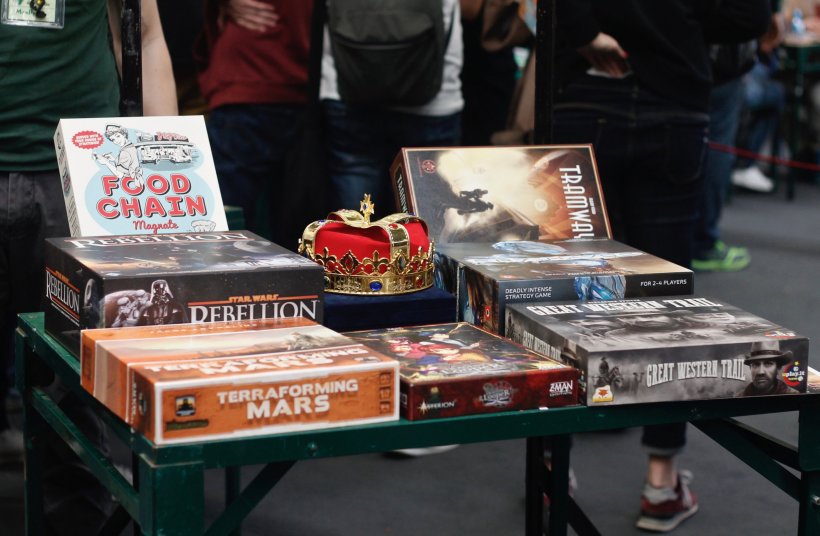
Come tutti gli anni proponiamo le interviste agli autori dei giochi da tavolo selezionati per il premio Goblin Magnifico. Iniziamo con Jacob Fryxelius, autore del sorprendente Terraforming Mars.
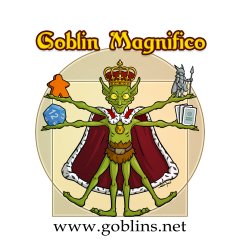
Jacob Fryxelius gestisce assieme ai fratelli la casa editrice di giochi in scatola FryxGames ed ha risposto con piacere alle domande che vengono da tutti i giurati del premio.
1) Facci sapere qualcosa di te: che tipo di giocatore sei? Parlaci dei tuoi giochi preferiti (non realizzati da te).
Principalmente giochi di carte tematici, ma in realtà mi piacciono vari tipi di giochi. Ho giocato vari CGS (collectible), TCG (tradeble), LCG (living). Per esempio ho apprezzato molto Lord of the Rings Trading Card Game. Purtroppo al momento non ho molte occasioni di giocare a questo tipo di giochi, così passo la maggior parte del tempo a playtestare i nostri prodotti. Mi piace anche giocare in solitario e mi piace molto Friday.
2) Perché “Terraformare Marte”? Perché si è preferito un tema scientifico e non il solito tema di conquista spaziale con navicelle e raggi laser? Per lo sviluppo di questo gioco sei partito dal tema o dalle meccaniche?
Essendo laureato in chimica sono affascinato dagli aspetti scientifici e i processi naturali, ho letto molto riguardo alla terraformazione, così è stato un passo naturale sviluppare un gioco su questo argomento. Tutti i miei giochi da tavolo partono dal tema. Quindi si trovano meccaniche legate al tema, a volte direttamente ispirate da esso.
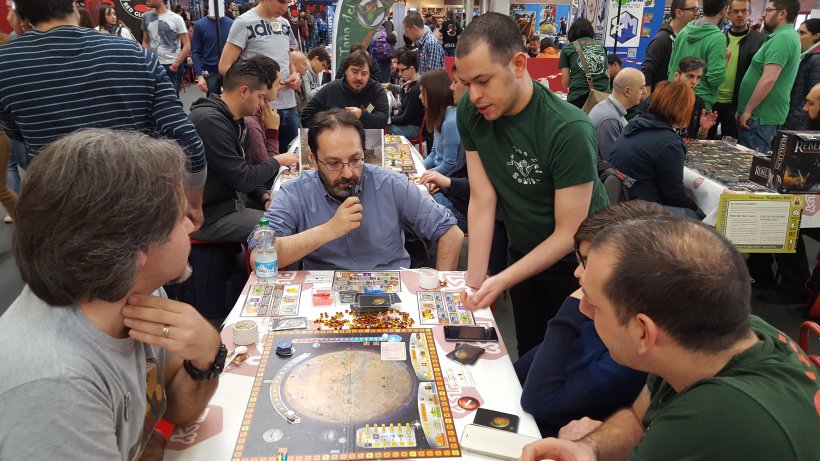
3) La gestione delle carte è veramente intrigante: compri carte, ma devi essere sicuro che ti serviranno, altrimenti stai sprecando soldi. Come hai sviluppato questa meccanica? Qual è stata l’idea centrale del gioco dall’inizio?
Il gioco è sempre stato centrato su questo aspetto. Terraforming Mars è stato pensato come un gioco economico dove tieni le carte per un futuro utilizzo. Calza dal punto di vista tematico: il tuo dipartimento di Ricerca e sviluppo ti presenta delle idee; tu decidi su quali investire e completi il finanziamento quando è il momento di finalizzare il progetto.
4) Il draft permette di migliorare la profondità strategica, ma brucia un sacco di tempo a turno. Inoltre non comprerai mai tutte le carte che ottieni dal draft, quindi avrai un’ulteriore scelta da compiere. Pensi che il draft sia un elemento accessorio o essenziale per godere appieno del gioco? Ovviamente considerando pregi e difetti della meccanica.
Non lo ritengo indispensabile, infatti io gioco raramente con il draft. Non mi infastidisce l’aspetto aleatorio, che comunque si livella. La pesca migliore per me è quando non mi interessa nessuna delle carte pescate – posso così concentrarmi sulla mano che ho già acquisito! Mi piacciono le possibilità e l’interazione aggiuntiva che offre il draft, per questo è una variante ufficiale, ma personalmente trovo il gioco più lineare senza draft. Specialmente perché spesso gioco con principianti, o con gente affetta da paralisi da analisi (come del resto lo sono io).
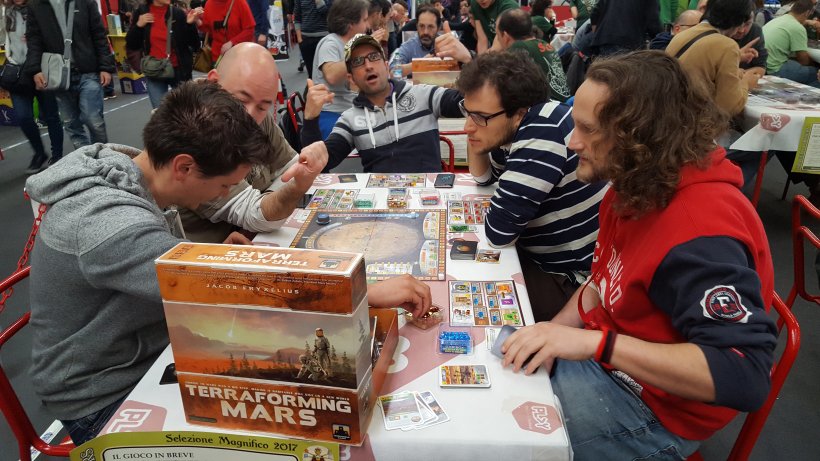
5) Il gioco si chiude al raggiungimento di certi obiettivi, ma lo scopo dei giocatori è fare punti, non terraformare Marte. Questo può portare a strane situazioni, dove la durata della partita si prolunga oltremodo. Ti è mai capitato di sforare le quatto ore di gioco, come è capitato a noi?
Non con il gioco base o la variante Corporate Era. Dipende dallo stile di gioco, ma i giocatori hanno a disposizione differenti motori di gioco e se uno non ha un buon motore per fare punti dovrebbe cercare di chiudere la partita prima di essere travolto dagli avversari. Anche chi è in testa è incentivato a fare punti. E se i punteggi sono ravvicinati gli step finali sui parametri di terraformazione sono semplicemente punti in più. Infine… se stai perdendo e vuoi avere tempo per una rivincita…
Quindi, effettivamente, ci possono essere delle situazioni in cui il tempo della partita si prolunga, ma ci sono abbastanza incentivi per chiudere la partita, però se tutti vogliono prolungarla hanno la possibilità di farlo.
6) Uno degli aspetti più interessanti del gioco è dato dalla grande quantità di carte e la vasta possibilità che offrono. Altri editori ne avrebbero ricavato una-due espansioni… come mai siete stati così generosi con noi?
Come può essere curato il tema è uno degli aspetti che più mi piacciono nei giochi card-driven, le carte possono implementare qualsiasi idea! E possono esserci così tante idee nel terraformare e colonizzare Marte. Avendo scelto per il gioco un focus scientifico abbiamo trovato adeguato che le carte rappresentassero dei brevetti unici. Questo ha comportato TANTO lavoro, ma ne è valsa la pena.
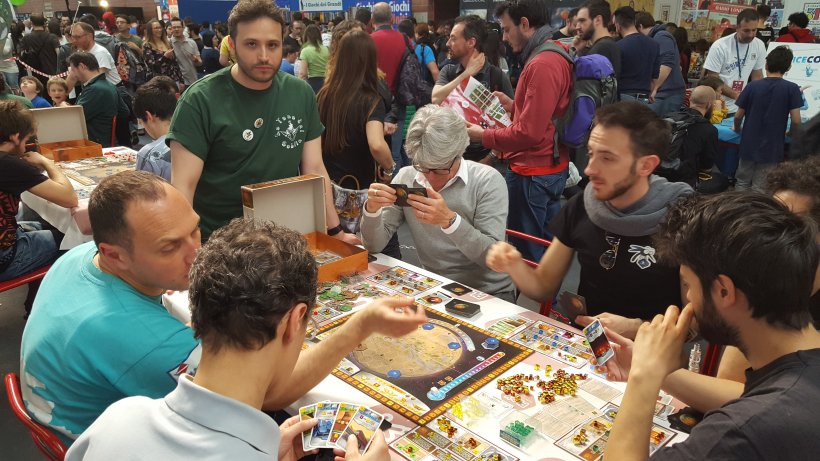
7) Ho giocato uno dei vostri primi giochi (Wilderness) trovandolo un buon gioco, con un forte tema e buone idee, ma acerbo in alcuni aspetti (troppo lungo, eliminazione del giocatore, ecc.). Come sei cresciuto in qualità di autore? E in che modo (leggendo testi, giocando, sviluppando giochi)?
In realtà Wilderness è stato sviluppato dai miei fratelli Thomas e Daniel, ma abbiamo tutti imparato da Wilderness e dai nostri primi giochi. L’eliminazione del giocatore è necessaria in Wilderness da un punto di vista tematico (altrimenti non sarebbe un gioco sulla sopravvivenza!) ma abbiamo capito che non è un bene essere troppo punitivi nei confronti dei giocatori. In tutti i nostri giochi inseriamo dei “take-that”, cercando di renderli ragionevoli e adatti dal punto di vista tematico. Abbiamo anche imparato a meglio bilanciare differenti effetti e a curare ogni aspetto nel gioco.
Abbiamo anche realizzato una versione riveduta di Wilderness, bilanciando meglio le carte, curando meglio le lotte tra animali, più tematiche e con meno alea, assieme ad altri cambiamenti. Speriamo di pubblicare, nel futuro, questa nuova versione.
Senza la lezione appresa dai nostri precedenti prodotti dubito che saremmo riusciti a prendere le giuste decisioni che abbiamo fronteggiato nello sviluppo di Terraforming Mars. Anche avere beta-tester è stato importante.
8) Kickstarter, Legacy, applicazioni per SmartPhones. Tre cose che sembrano invadere e cambiare il mondo dei giochi da tavolo. Hai un parere positivo o negativo su ciascuno di essi?
Kickstarter è un ottimo sistema, perché permette a sviluppatori indipendenti di ottenere una base per la pubblicazione. Quello che non riesco a capire è quanto riescono effettivamente a realizzare con tutti quegli stretch goal che inseriscono. Il business dei giochi da tavolo è stretto. Il legacy penso possa ricoprire una piccola parte del mondo dei boardgame. Il concetto è cool, ma ha le sue limitazioni.
Le app non mi piacciono particolarmente. Penso che i giochi da tavolo dovrebbero essere fisici e mentali, non digitali. Sicuramente continueranno ad esserci, ma penso abbiano un uguale opportunità di migliorare un gioco quanto di rovinarlo. Penso ci sia un sottile confine che se oltrepassato rende l’esperienza simile a un gioco per computer e può far perdere interesse.
9) Hai giocato gli altri sette selezionati del nostro premio? Cosa ne pensi?
Purtroppo non li ho provati. Come detto il tempo disponibile per giocare è drasticamente diminuito negli ultimi 1-2 anni.
10) A quali nuovi giochi da tavolo stai lavorando? Raccontaci un po’ dei progetti futuri.
Oltre a lavorare alle varie espansioni di Terraforming Mars spero di far uscire il mio gioco di carte sugli zombi “After the virus” per Essen.
Si tratta di un nuovo tipo di deck-building dove il mazzo viene progressivamente invaso dagli zombi, mentre si tenta di mettere buone carte e costruire un tableau per la protezione e completare gli obiettivi di missione. Sarà un grande giochino di carte cooperativo. :)
E ovviamente anche i miei fratelli hanno i loro progetti in canna…
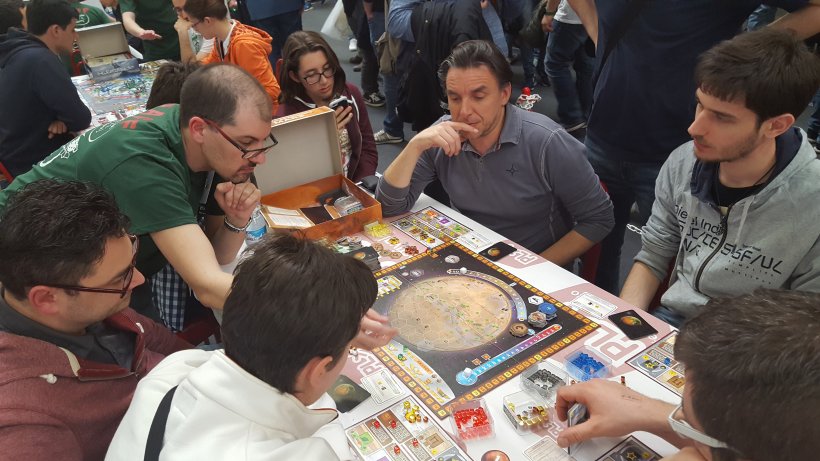
1) Tell us something about you: what kind of player are you? Tell us your favourite games (not made by you).
Thematic card games player. But I enjoy most kind of games. I've been playing several CCGs, TCG, and LCGs. For example the Lord of the Rings TCG was really good. Unfortunately, I don't have so much time these days to play games, so It's mostly playtesting our own games. I do get some solo games in though, and I really enjoy Friday.
2) Why Terraforming Mars? Why this scientific theme and not the usual space war with battleships and laser rays? Did you started from theme or mechanics, in this game?
As a doctor of chemistry, I'm fascinated about natural processes and science, and having read about terraforming, making a game about it was a very natural next step. Theme comes first in all my games. Then you find mechanics that fit the theme, often directly inspired by it.
3) The card system is really intriguing: you buy cards, but you must be sure they will really help you, or you are simply wasting you money. How did you develop this system? Was it the core idea of the game since the beginning?
Yes, it was always there. TM was going to be an economic game with cards you hold on to for later, so there needed to be an investment. It fits really well thematically: your R&D department comes up with ideas, you decide which ones to invest in and develop, and then you make a full commitment when it's time to implement the project.
4) Drafting: surely is a further step into strategy, but it takes a lot of time doing it every round. Moreover, you will never buy all the cards you pick, so you always have some choice. Do you think draft is essential to fully enjoy the game or just something accessory? I mean considering both virtues and vices of the mechanic.
No, it isn't essential. In fact, I rarely play with draft myself. I don't mind the luck factor, and the luck usually evens out anyway. My best draws are when I don't want any of the cards - finally I can afford to play my hand! I do enjoy all the extra interaction and possibilities that are in the draft (which is why it's an official variant), but for me it just plays smoother without. Especially since I often play with beginners and AP people (including myself!).
5) The game stops reaching some objectives. But players' ojective is to make points, not to terraform Mars. Sometimes this brings to strage situations, when the game protracts itself so long. Did you ever have a 4-hours-long game in your playtests, as we experimented?
Not with the base game or Corporate Era. It can definitely depend on play style, but players have different engines and if a player has a weaker scoring engine, that player should try to end the game before the others can steamroll him/her. A player in the lead also has incentive to end the game. And if scores are close, those last steps on the parameters are points that only you get. Or, if you are losing and want to have time for a revenge game...
So, yes, there can be some situations where the game gets long, but usually there is enough incentive to end the game. But if everyone wants to go on, they are free to do so.
6) One of the best things on the game is the huge cards amount and the great amount of possibilities they offer. Some other editors would have obtained one or two expansions...why have you been so generous with us?
Theme. This is what I like with card driven games - cards can implement any idea into a game! And there are so many ideas in the realm of terraforming and of colonizing Mars. With the scientific focus of the game, we also felt that it fit to have the cards represent unique patents.
This has meant a LOT of work, but it was definitely worth it.
7) I played one of your first games (Wilderness) and it was a good game, with a strong theme and a good concept, but green, in some aspects (too long, player elimination, etc). How did you develop and evolved as, a game designer? And by what (reading, playing, designing)?
Actually it was Thomas and Daniel that developed Wilderness, but we have all learned from Wilderness and our other earlier games. Player elimination was thematically necessary in Wilderness (otherwise it wouldn't be a survival game!), but we've learned to take negative player experience very seriously. All our games have some take-that, but we try to keep it reasonable and thematic. We have also learned to balance different effects better and to really look at every detail and aspect of playing the games.
We have made a revised version of Wilderness where we've balanced the cards better, made animal fights more thematic and a little less random, along with some other small changes. Hopefully we can release it in the future.
Without all the lessons learned from our previous games I doubt we would have made the right calls in the hundreds of decisions we faced during the development of Terraforming Mars. Having beta-testers helped too.
8) Kickstarter, Legacy System, SmartPhones' Apps. Three things that seem invading and changing the world of boardgaming. Do you have a positive or negative opinion about each of them?
Kickstarter is great because it allows independent developers to reach out and get a basis for publishing. What I can't figure out though is how they make any profit with all those stretch goals. Boardgames is a tough business. The legacy system I can see staying a small part of the gaming industry. It's a really cool concept but it has its limitations. Apps are less to my liking. I think boardgames should be physical and mental, not digital. They're here to stay for sure, but I think they have an equal opportunity to enhance a game as they have to ruin it. In my opinion there's a very thin and easily crossed line where the experience becomes too much of a computer game and people will lose interest.
9) Did you played the other seven games in the selection (...)? What do you think about them?
Sadly, no. As I said before, my gaming time has been severely limited the last 1-2 years.
10) What new games are you working on? Tell us something about your future projects.
Besides working on multiple expansions for Terraforming Mars, we hope to release my zombie card game 'After the Virus' at Essen. It's a different kind of deckbuilder where the deck gets more and more invaded by zombies, while you try to get good cards in there too, as well as build up a tableau for protection and completing your mission requirements. It will be a great little cooperative card game.
And of course, my brothers have their games in the pipeline too...
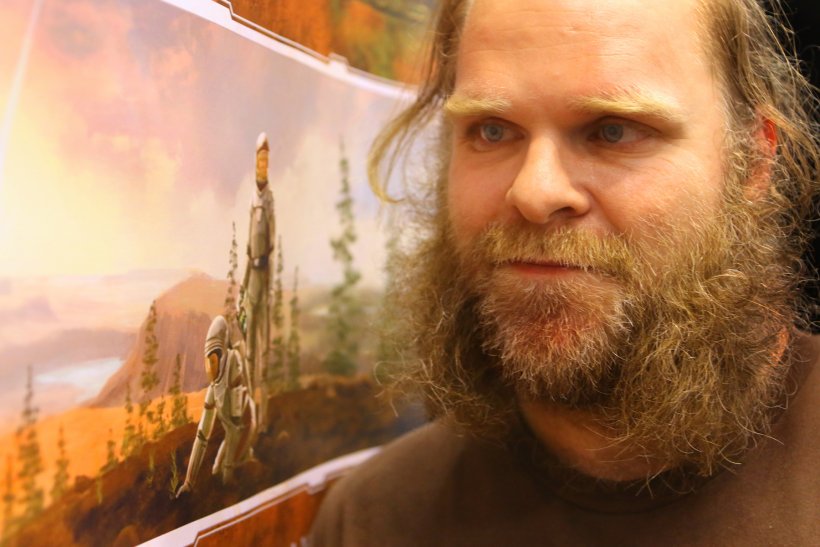

e così così ci siamo tolti qualche curosità su Terraforming Mars... e presto arriveranno altre interviste.
Molto interessante.
Continuate così.
Ottimo lavoro. Giusto mettere anche l'intervista in lingua madre ;)
Molto interessante come intervista, anche se potevate mettere qualche foto di Jacob Fryxelius! :P
Molto interessante come intervista, anche se potevate mettere qualche foto di Jacob Fryxelius! :P
accontentato :)
Non per fare il bacchettone, ma credo che quando dice a "doctor of chemistry" intendesse un PhD in chimica, non una laurea.
Comunque, molto interessante.
Bravi.
Molto interessante come intervista, anche se potevate mettere qualche foto di Jacob Fryxelius! :P
accontentato :)
Altro che PhD in chimica. Questo ha un master in stupro e saccheggio all'università Vichinga!
Per scrivere un commento devi avere un account. Clicca qui per iscriverti o accedere al sito
Accedi al sito per commentare© 2004 - 2023 Associazione Culturale - "TdG" La Tana dei Goblin
C.F./P.IVA: 12082231007 - P.le Clodio 8, 00195 Roma
Regolamento del sito | Archivio | Informativa privacy e cookie | Contatti
La Tana dei Goblin protegge e condivide i contenuti del sito in base alla seguente licenza Creative Commons: Attribuzione - Non Commerciale - Condividi allo stesso modo, v.4.0. Leggi il testo sintetico, oppure il testo legale della licenza.